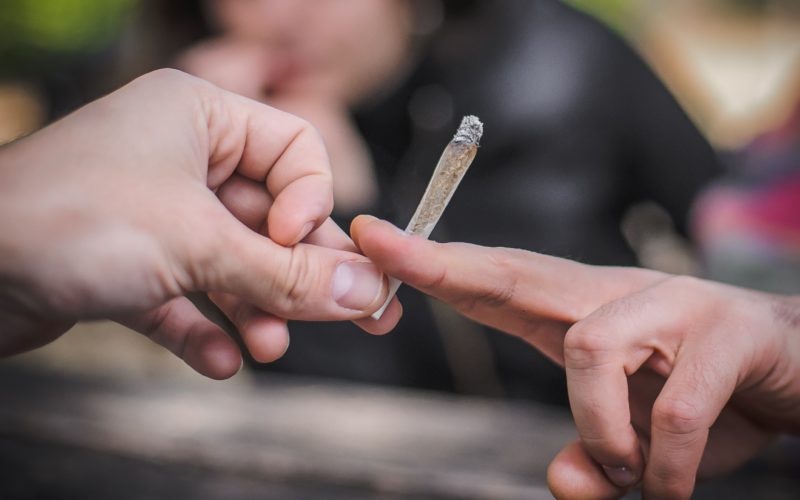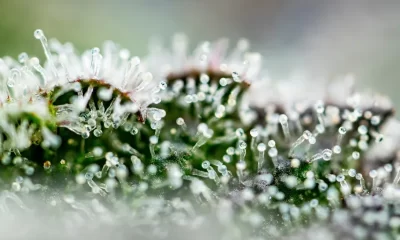Business
Study Shows 20% Increase in Frequency of Cannabis Consumption in Recreational States

In reviewing data about twins, researchers found that cannabis use increased for those who lived in a recreational cannabis state versus one that has not yet legalized.
A new study published in the journal Addiction on Aug. 24 analyzed cannabis consumption data across the nation, with a specific focus on adult identical twins. Called “Impacts of recreational cannabis legalization on cannabis use: a longitudinal discordant twin study,” the study used twins to explore the frequency of cannabis across two different states.
“In this study, we evaluated the effects of recreational cannabis legalization in a large sample of prospectively assessed adult twins from similar cohorts of individuals born in Colorado and Minnesota, demographically similar states with different cannabis policies,” the researchers presented in their introduction. “While many participants still reside in their birth states, some participants have migrated to other states resulting in pairs discordant for exposure to recreational legalization.”
Researchers reviewed data from either the Minnesota Center for Twin Family Research or the University of Colorado, Boulder Center for Antisocial Drug Dependence, with a total of 3,452 individuals (split between 1,700 individuals from Minnesota and 1,752 from Colorado). All individuals had previously been asked about their cannabis use before and after 2014, when the state of Colorado legalized recreational cannabis, and Minnesota legalized medical cannabis. Of this number, there was a split among different types of twins: monozygotic (363 pairs), same-sex dizygotic (208) pairs and opposite-sex dizygotic (129 pairs).
The researchers concluded that in 111 pairs of twins, there were no genetic influences that led to cannabis consumption frequency, however they did confirm that “Existing genetic influences were moderated by the legal environment, as the genetic correlation between marijuana use before and after legalization was lower in states that legalized compared with states that did not.”
“Using a longitudinal design accounting for age, sex and earlier cannabis use, we found a ~24% increase in mean cannabis use frequency attributable to legalization,” researchers explained. “Furthermore, co-twin control results indicate that within monozygotic pairs, the twin living in a legal state uses cannabis ~20% more frequently than their illegally residing co-twin.”
However, the researchers also noted that nearly 92% of participants were white and projected how the inclusion of more non-white participants could alter the results. “An important extension of our work would be to investigate individual differences in the context of cannabis policy with respect to sex or racial background. Prior to recreational legalization, black Americans disproportionately bore the consequences of cannabis law enforcement,” researchers wrote. “Racial disparities in pre-legalization enforcement could mean that the legalization-related environmental changes experienced by black Americans were more dramatic than those experienced by their white counterparts, but we are not able to address this issue effectively in these samples.”
In their conclusion, researchers stated that this particular topic could use more elaboration to further understand how cannabis may have affected people in other states. “Through the use of zygosity-stratified co-twin control analyses, we found a ~20% increase in cannabis use frequency, consistent with a causal effect of recreational legalization,” they wrote. “These results do not, by themselves, demonstrate how more frequent use in legal states translates to changes in health or behavioral consequences, therefore future work is necessary to further address complex questions around the public health impacts of legalization and vulnerability to widely available marijuana.”
On Aug. 24, a new study from the National Institutes of Health found that consumption of cannabis and hallucinogens is at an all-time high for individuals between the ages of 19-30. Researchers said that consumption in this age group has “increased significantly in 2021 compared to five and 10 years ago,” and is the highest level of consumption since 1988.
National Institute on Drug Abuse Director Nora Volkow said in an accompanying statement that this research is crucial to understanding the long-term effects of cannabis on youth. “As the drug landscape shifts over time, this data provides a window into the substances and patterns of use favored by young adults. We need to know more about how young adults are using drugs like marijuana and hallucinogens, and the health effects that result from consuming different potencies and forms of these substances,” Volkow said. “Young adults are in a critical life stage and honing their ability to make informed choices. Understanding how substance use can impact the formative choices in young adulthood is critical to help position the new generations for success.”
Business
New Mexico cannabis operator fined, loses license for alleged BioTrack fraud

New Mexico regulators fined a cannabis operator nearly $300,000 and revoked its license after the company allegedly created fake reports in the state’s traceability software.
The New Mexico Cannabis Control Division (CCD) accused marijuana manufacturer and retailer Golden Roots of 11 violations, according to Albuquerque Business First.
Golden Roots operates the The Cannabis Revolution Dispensary.
The majority of the violations are related to the Albuquerque company’s improper use of BioTrack, which has been New Mexico’s track-and-trace vendor since 2015.
The CCD alleges Golden Roots reported marijuana production only two months after it had received its vertically integrated license, according to Albuquerque Business First.
Because cannabis takes longer than two months to be cultivated, the CCD was suspicious of the report.
After inspecting the company’s premises, the CCD alleged Golden Roots reported cultivation, transportation and sales in BioTrack but wasn’t able to provide officers who inspected the site evidence that the operator was cultivating cannabis.
In April, the CCD revoked Golden Roots’ license and issued a $10,000 fine, according to the news outlet.
The company requested a hearing, which the regulator scheduled for Sept. 1.
At the hearing, the CCD testified that the company’s dried-cannabis weights in BioTrack were suspicious because they didn’t seem to accurately reflect how much weight marijuana loses as it dries.
Company employees also poorly accounted for why they were making adjustments in the system of up to 24 pounds of cannabis, making comments such as “bad” or “mistake” in the software, Albuquerque Business First reported.
Golden Roots was fined $298,972.05 – the amount regulators allege the company made selling products that weren’t properly accounted for in BioTrack.
The CCD has been cracking down on cannabis operators accused of selling products procured from out-of-state or not grown legally:
- Regulators alleged in August that Albuquerque dispensary Sawmill Sweet Leaf sold out-of-state products and didn’t have a license for extraction.
- Paradise Exotics Distro lost its license in July after regulators alleged the company sold products made in California.
Golden Roots was the first alleged rulebreaker in New Mexico to be asked to pay a large fine.
Source: https://mjbizdaily.com/new-mexico-cannabis-operator-fined-loses-license-for-alleged-biotrack-fraud/
Business
Marijuana companies suing US attorney general in federal prohibition challenge

Four marijuana companies, including a multistate operator, have filed a lawsuit against U.S. Attorney General Merrick Garland in which they allege the federal MJ prohibition under the Controlled Substances Act is no longer constitutional.
According to the complaint, filed Thursday in U.S. District Court in Massachusetts, retailer Canna Provisions, Treevit delivery service CEO Gyasi Sellers, cultivator Wiseacre Farm and MSO Verano Holdings Corp. are all harmed by “the federal government’s unconstitutional ban on cultivating, manufacturing, distributing, or possessing intrastate marijuana.”
Verano is headquartered in Chicago but has operations in Massachusetts; the other three operators are based in Massachusetts.
The lawsuit seeks a ruling that the “Controlled Substances Act is unconstitutional as applied to the intrastate cultivation, manufacture, possession, and distribution of marijuana pursuant to state law.”
The companies want the case to go before the U.S. Supreme Court.
They hired prominent law firm Boies Schiller Flexner to represent them.
The New York-based firm’s principal is David Boies, whose former clients include Microsoft, former presidential candidate Al Gore and Elizabeth Holmes’ disgraced startup Theranos.
Similar challenges to the federal Controlled Substances Act (CSA) have failed.
One such challenge led to a landmark Supreme Court decision in 2005.
In Gonzalez vs. Raich, the highest court in the United States ruled in a 6-3 decision that the commerce clause of the U.S. Constitution gave Congress the power to outlaw marijuana federally, even though state laws allow the cultivation and sale of cannabis.
In the 18 years since that ruling, 23 states and the District of Columbia have legalized adult-use marijuana and the federal government has allowed a multibillion-dollar cannabis industry to thrive.
Since both Congress and the U.S. Department of Justice, currently headed by Garland, have declined to intervene in state-licensed marijuana markets, the key facts that led to the Supreme Court’s 2005 ruling “no longer apply,” Boies said in a statement Thursday.
“The Supreme Court has since made clear that the federal government lacks the authority to regulate purely intrastate commerce,” Boies said.
“Moreover, the facts on which those precedents are based are no longer true.”
Verano President Darren Weiss said in a statement the company is “prepared to bring this case all the way to the Supreme Court in order to align federal law with how Congress has acted for years.”
While the Biden administration’s push to reschedule marijuana would help solve marijuana operators’ federal tax woes, neither rescheduling nor modest Congressional reforms such as the SAFER Banking Act “solve the fundamental issue,” Weiss added.
“The application of the CSA to lawful state-run cannabis business is an unconstitutional overreach on state sovereignty that has led to decades of harm, failed businesses, lost jobs, and unsafe working conditions.”
Business
Alabama to make another attempt Dec. 1 to award medical cannabis licenses

Alabama regulators are targeting Dec. 1 to award the first batch of medical cannabis business licenses after the agency’s first two attempts were scrapped because of scoring errors and litigation.
The first licenses will be awarded to individual cultivators, delivery providers, processors, dispensaries and state testing labs, according to the Alabama Medical Cannabis Commission (AMCC).
Then, on Dec. 12, the AMCC will award licenses for vertically integrated operations, a designation set primarily for multistate operators.
Licenses are expected to be handed out 28 days after they have been awarded, so MMJ production could begin in early January, according to the Alabama Daily News.
That means MMJ products could be available for patients around early March, an AMCC spokesperson told the media outlet.
Regulators initially awarded 21 business licenses in June, only to void them after applicants alleged inconsistencies with how the applications were scored.
Then, in August, the state awarded 24 different licenses – 19 went to June recipients – only to reverse themselves again and scratch those licenses after spurned applicants filed lawsuits.
A state judge dismissed a lawsuit filed by Chicago-based MSO Verano Holdings Corp., but another lawsuit is pending.
Source: https://mjbizdaily.com/alabama-plans-to-award-medical-cannabis-licenses-dec-1/
-

 Business2 years ago
Business2 years agoPot Odor Does Not Justify Probable Cause for Vehicle Searches, Minnesota Court Affirms
-

 Business2 years ago
Business2 years agoNew Mexico cannabis operator fined, loses license for alleged BioTrack fraud
-

 Business2 years ago
Business2 years agoAlabama to make another attempt Dec. 1 to award medical cannabis licenses
-

 Business2 years ago
Business2 years agoWashington State Pays Out $9.4 Million in Refunds Relating to Drug Convictions
-

 Business2 years ago
Business2 years agoMarijuana companies suing US attorney general in federal prohibition challenge
-

 Business2 years ago
Business2 years agoLegal Marijuana Handed A Nothing Burger From NY State
-

 Business2 years ago
Business2 years agoCan Cannabis Help Seasonal Depression
-

 Blogs2 years ago
Blogs2 years agoCannabis Art Is Flourishing On Etsy











